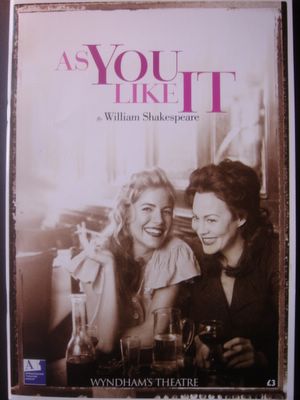Where art thou my sweet Rosalind?

Ms. Sienna Miller and Ms. Helen McCrory

I'm afraid I'll have to bother the Honourable Reader with another go at my West End soirée. I should start by saying that Ms McCrory as Rosalind was very impressive but I could not help keeping reminding her as Anna Karenina (in a DVDized mini-series). There were almost "Russian" hysterical desperate traits in her Rosalind that I'm not that sure that it's either justifiable in Tudor comedy or in 1940's France (this production's choice).
Anyway, I want to share with you the latest developments on the "Bay of Portugal" front.
I had commented, in SparkNotes, upon SonnetCLV's interpretation:
bottomless bay of Portugalposted by Moydroog on 9/22 5:18 AM
I do find it an extremely interesting possibility, totally buying the "whole Atlantic Ocean" scenario, only not sure about the chuckle. In that context, two small reservations : "As You Like It" was written in 1598-99 almost one hundred years after the climax of Portuguese Discoveries (India and Gama 1498; Brazil and Cabral 1500), so the "boasting" about the Atlantic Ocean being a Portuguese pond would have to be an enduring one; on the other hand Portugal lost its independence in 1580, meaning that the author would be making humour at the expense of a fallen and beaten (as a matter of fact quite friendly to Britain ) man-country. But what I have more difficulty with is emotions-related - when Rosalind is trying to describe the depth of her love (almost with the bitter-sweet suffering nostalgia in the moment of remembering her love that we Portuguese call "saudade") would she have conjured an image that makes people laugh? W.S. could of course do it (playing in the "chaud froid" effect of antithetical emotions ) but as to Rosalind I doubt it.
Now, unrelenting, SonnetCLV has answered back:
the bay of Portugal posted by SONNETCLV on 9/22 12:47 PM
You make good arguments to defend your position, which may be proper. I would have used the same arguments to rattle my proposition. But in the absence of an actual "bay of Portugal" and based upon the documentation of ships such as the Tyger which were "lost" in the "bay of Portugal" while on their way to Virginia by way of the Canary Islands, one can surmise that the Atlantic was indeed this very bay.
Could the memory have endured for a number of years? Certainly. The year 1498 was not so far away from Shakespeare's era and the time of As You Like It. The documents that did exist were few in comparison to today's glut of information, and so everyone shared what information there was. Too, as I am witness to here in my own country, the memory of prejudices lives long. It should not be unusual for an Englishman of Shakespeare's time to refer to the Atlantic as Portugal's pond, had this been an expression from former times. One thing Elizabethan England could boast of was its spirit of nationalism. Few Englishmen, probably, sad though it may be, cared much about what happened elsewhere in the world. The kind of empathy we're used to today was hardly part of an age that could, for instance, condemn and burn witches, physicists, and Bible translators for heresy. Portugal, after all, did not share Elizabeth's religious persuasion. That alone could keep any old jokes alive and well.
Remember that the expression "bay of Portugal" might well have been an English invention in the first place. ThePortuguesee themselves may never have used it. I have not read anyPortuguesee sailing documents of the era, so I cannot attest to what terms were or were not used. But the term shows up in English papers, and it may have been used derogatorily by a people who took great pride in their own advances as a sea power.
The analysis of Rosalind's motivations within the context of her character prove more problematic. You're right to question whether Ros would make such a joke to Celia in the context of her profession of love. She is a wit, to be sure, and she is a braod ranging personality. But one must also consider that her words are from the playwright, and the playwright often plays with his character's words to put in mouths things for the audience's sake. I'm convinced that Shakespeare's characters often do not know the fullest meaning of what they say. They can only speak from the context of their own world.
But Shakesepare and his audience can understand their language from another context -- their own world. Which is why in Macbeth Macbeth can proclaim "Horrible sight" at the very entrance of the spirit king who represents James. Even James did not understand the full implications of the proclamation. Macbeth certainly did not. But Shakespeare, and a privy few in the audience, had to chuckle at this most serious moment in the play, for it is making fun of King James who is, for those Englishmen who hated him, a true "horrible sight." Of course, I'm speculating here. But I am fond of this speculation nonetheless. It makes sense to me, and I do not believe it is "off the wall", as we say. As You Like It is a vast play, as are all of Shakespeare's plays, and it relies heavily upon allusions from a wide range of sources.
Rosalind, Shakespeare's greatest female, is a beloved character who would have captured the hearts of her English audience. That she might perpetrate the "old joke" of the "bay of Portugal" is not something that would alienate her from that audience.
--SONNET CLV--
Any Rosalinds left out there?
No comments:
Post a Comment